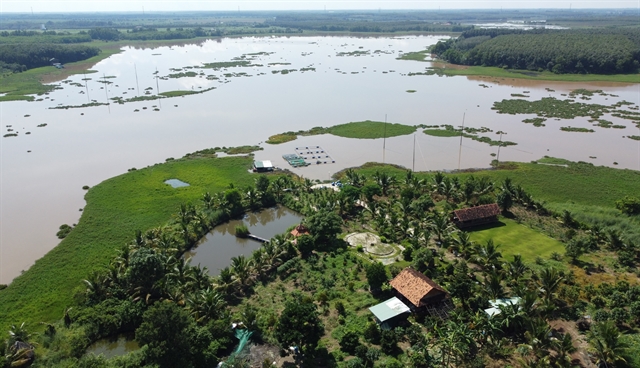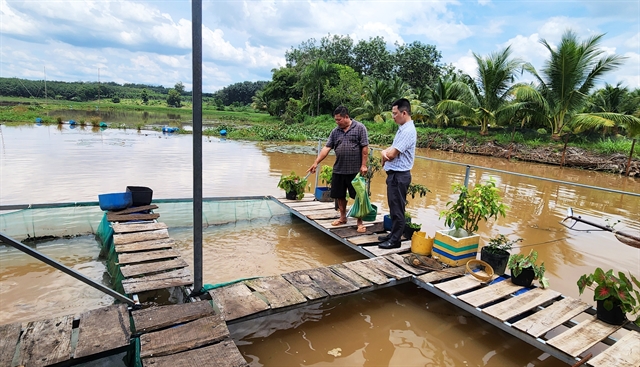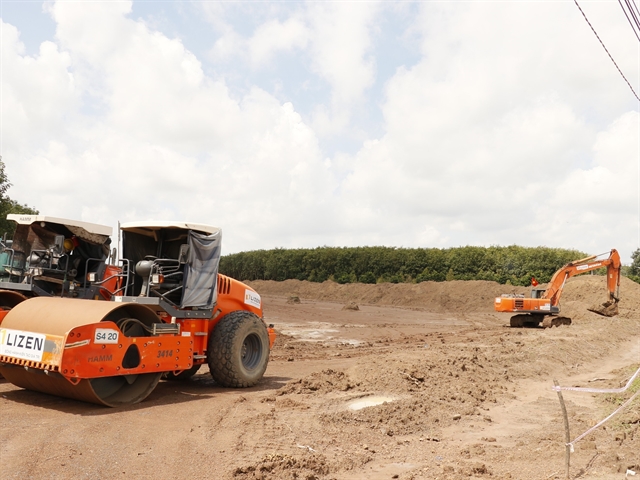 Society
Society


|
| The Phước Hòa Reservoir in Đồng Nai Province’s Nha Bích Commune has great potential for developing eco-urban areas, golf courses combined with urban zones, and tourism and resort services. – VNA/VNS Photo Đậu Tất Thành |
ĐỒNG NAI – Nha Bích Commune is expected to become a new growth pole in southern Đồng Nai Province thanks to its strategic location, excellent transport links and abundance of natural resources.
Following the administrative merger of the former Bình Phước Province with Đồng Nai on July 1, Nha Bích Commune was formed by merging the three communes of Nha Bích, Minh Thắng and Minh Lập in Bình Phước Province’s Chơn Thành Town.
Nguyễn Hồng Thái, deputy secretary of the Nha Bích Party Committee and chairman of its People’s Committee, said the commune is gaining an increasingly strategic role in the development of the new Đồng Nai Province.
The commune lies along key transport routes such as the HCM City–Thủ Dầu Một–Chơn Thành Expressway, the North–South Expressway and National Highway 14, which are being upgraded and expanded, he said.
This connectivity facilitates trade and drives growth in industry, services and tourism, he said.
With its vast area, flat terrain, the 2,000ha Phước Hòa Reservoir, and the planned 285ha Minh Lập Industrial Park, Nha Bích has strong advantages for developing high-tech agriculture, eco-urban zones, eco-tourism, and export-oriented processing industries.
The commune’s administration considers enterprises the centre of development and the driving force behind economic restructuring.
Thái said: “The business community in Nha Bích always works with the local government in improving infrastructure and the investment environment, building new-style rural areas, and raising people’s quality of life.
“The commune is committed to improving its business and investment climate through faster administrative reform, shorter processing times and transparent land-use planning.
“These efforts will make it easier for businesses to access information and invest effectively.”
According to Nguyễn Thanh Phong, deputy director of the provincial Department of Science and Technology, the commune should proactively connect with enterprises, bring science and technology closer to them, and foster a service-oriented administrative culture.
This would help businesses innovate production models, enhance their competitiveness and integrate more deeply into regional and export value chains, he added.
The 2,000ha Phước Hòa Reservoir, considered a “green gem,” holds major prospects for eco-tourism development.
Surrounded by the Bé River, the reservoir serves as a key source of water for the southeastern region.
It is classified as a national-level reservoir and provides upstream water for the Dầu Tiếng Reservoir and the Đồng Nai River, making it ideal for developing an eco-tourism hub, they said.
People living in the vicinity of the reservoir have also expressed a desire to join tourism development.
Trần Hoài Vũ, who has earned a living off the reservoir for more than 10 years, said: “The Phước Hòa Reservoir has beautiful scenery and abundant aquatic resources. If developed as a tourist site, it could create jobs for locals and boost the commune’s economy.”
Thái said: “The Phước Hòa Reservoir has tremendous potential for socio-economic growth. It is conveniently located near the Gia Nghĩa–Chơn Thành and HCM City–Thủ Dầu Một–Chơn Thành expressways, which make travel easier for visitors.”

|
| People living near the Phước Hòa Reservoir in Đồng Nai Province’s Nha Bích Commune resort to cage fish farming to boost their incomes and entertain tourists. – VNA/VNS Photo Đậu Tất Thành |
Improving people’s lives
Along with economic growth, the commune is also focused on preserving and promoting the cultural identity of its ethnic communities.
It is home to some 13 ethnic groups, including large Khmer and S’tiêng communities.
Most locals once relied on small-scale farming, but their living standards have improved markedly in recent years.
Rural infrastructure has been upgraded, and co-operative and service-based economic models have expanded, improving people’s incomes and quality of life.
Thạch Thị Kiều Oanh, a Khmer local, said: “People’s living conditions have improved significantly thanks to the care and support of the authorities. With the establishment of the new commune, public services have become more efficient.”

|
| The Gia Nghĩa - Chơn Thành Expressway running through Nha Bích Commune in Đồng Nai Province is under construction in Hamlet 3. – VNA/VNS Photo K GỬIH |
In 2020–25 the commune’s economic structure has shifted towards trade, services and small-scale industry, while the share of agriculture has shrunk.
Industrial and construction output has continued to grow, and now accounts for around 16.6 per cent of the economy.
The average per capita income has increased and is expected to top VNĐ85 million (US$3,220) this year.
Nha Bích has been recognised as an advanced new-style rural commune under the national target programme on building new-style rural areas.
Its rural landscape has changed significantly, with the economy shifting towards commodity-based production, focused infrastructure investment, improving living standards, stable security and order, a solid political system, and stronger local governance.
In the next five years the commune targets average annual economic growth of 10–12 per cent.
By 2030, the average per capita income is expected to rise by 40–45 per cent from 2025.
The poverty rate, based on the multidimensional poverty standard, will remain below 0.05 per cent.
Health insurance coverage is projected to reach 97 per cent, and 95 per cent of residents will have access to clean water by 2030. – VNS




